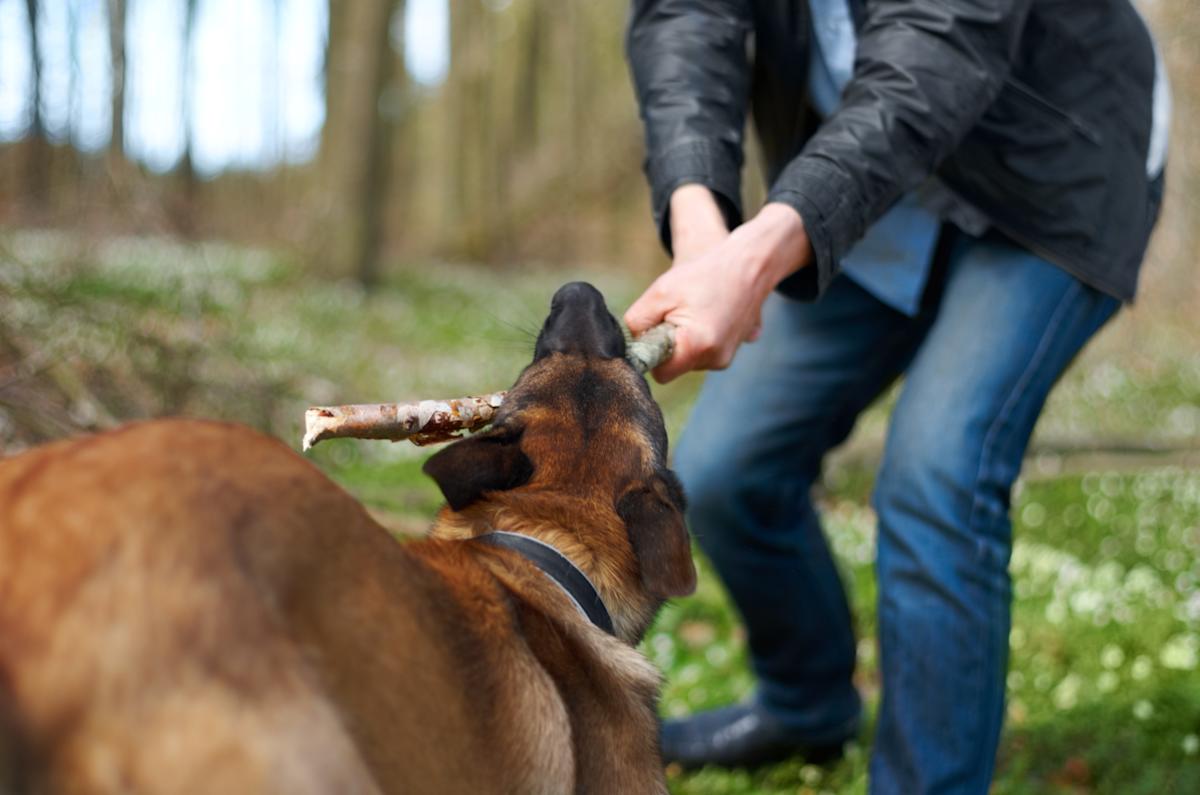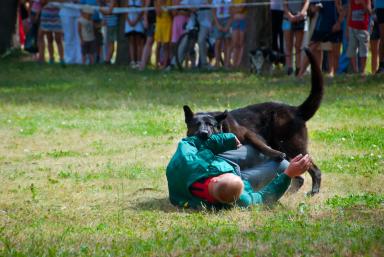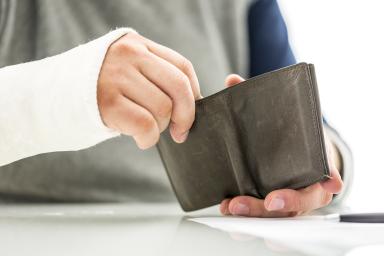How Liability Is Determined in Dog Bite Lawsuits [2024]

Dog bite incidents are more common than one might think, often leading to complex legal disputes over liability and compensation. Each year in the United States, approximately 12,480 people are hospitalized for dog bite injuries. Many of these cases result in injuries that require extensive medical attention and, in some instances, legal action.
Understanding how liability is determined in dog bite lawsuits is crucial for dog owners and victims. It's a multifaceted process influenced by state laws, individual circumstances, and legal principles. In this article, we'll explore the intricacies of liability in dog bite cases, highlighting the factors that come into play, the legal defenses available, and what parties should be aware of when navigating this often emotionally charged legal terrain.
Determining Liability
Understanding how liability is determined is essential when dealing with the legal consequences of such incidents. However, it's important to recognize that the rules and standards governing dog bite liability can vary significantly depending on the state where the incident occurred. While the following explanation will delve into the general factors and considerations that influence liability in dog bite cases, check with your jurisdiction to determine which laws apply to your situation.
Strict Liability Doctrine
In many jurisdictions that adopt these laws, strict liability means that a dog owner can be held liable for injuries caused by their dog’s bite or attack, even if:
They had no prior knowledge of their dog’s aggressive capabilities.
They took reasonable precautions to prevent their dog from harming others.
The victim did not provoke the dog or trespass on the owner’s property.
It's also important to consider that strict liability can apply to either the person who owns the dog or the person in possession of it at the time of the bite or attack. This can include anyone responsible for the dog, such as a sitter or handler.
Other critical key elements include:
Harmful Act: The strict liability doctrine applies to situations where the dog inflicts harm, such as biting or attacking someone. It does not cover harm caused by other actions, like a dog knocking someone over without biting.
Location: The injury typically must occur in a public place or area where the victim is legally allowed to be, such as the owner's property, with permission. If someone is bitten while unlawfully trespassing on private property, strict liability may not apply.
Legal Requirements: Laws regarding strict liability in dog bite cases vary by jurisdiction. Some areas have specific statutes that outline conditions under which strict liability applies, while others rely on common law principles.
Negligence
In some cases, a combination of strict liability and negligence principles may be applied. Negligence refers to the failure of a dog owner to exercise reasonable care in preventing their dog from causing harm to others. To establish negligence in a dog bite case, the injured party must prove the following elements:
Duty of Care: The plaintiff must demonstrate that the dog owner owed a duty of care to prevent the dog from causing harm to others. In most cases, dog owners are legally obligated to control and restrain their dogs to prevent them from biting or attacking people.
Breach of Duty: The plaintiff must show that the dog owner breached their duty of care by failing to take reasonable precautions to prevent the dog from biting or attacking. This breach of duty may involve actions or omissions, such as allowing the dog to roam freely in an area where it could harm others.
Causation: The plaintiff must establish a direct link between the dog owner’s breach of duty and the injuries suffered by the victim. In other words, it must be demonstrated that the dog owner’s negligence was the proximate cause of the dog bite incident.
Damages: The plaintiff must have suffered actual damages due to the dog bite or attack. These damages include medical expenses, pain and suffering, lost wages, and other related costs.
It's important to note that negligence can be a basis for liability in dog bite cases in addition to or instead of strict liability, depending on the jurisdiction and the specific requirements of the case.
One-Bite Rule
Under the One-Bite Rule, a dog owner is typically not held liable for a dog bite or attack unless they know their dog's dangerous or aggressive tendencies. In other words, the owner is given "one free pass," and they may only be held liable for injuries caused by their dog if they were aware of the dog's propensity to bite or attack because it had previously bitten or acted aggressively.
Many jurisdictions have moved away from the one-bite rule and replaced it with stricter liability standards. This is often done to provide greater protection to potential victims of dog bites and to place more responsibility on dog owners to prevent attacks. As mentioned earlier, strict liability or negligence principles are more commonly applied in modern dog-bite cases.
Potential Defenses
Provocation and trespassing are two potential defenses that the defendant, the dog owner, might raise in a dog bite case to contest liability. These defenses aim to show the plaintiff, the person who was bitten, bears some responsibility for the incident, which can affect the case outcome.
Provocation as a Defense
The defendant must demonstrate that the plaintiff engaged in significant and unreasonable actions to use provocation as a defense. In other words, the plaintiff's behavior must have been more aggressive than a typical interaction with a dog. Examples can include hitting, kicking, taunting, or intentionally causing harm or distress to the dog.
If the court determines that provocation played a significant role in the dog bit incident, it may reduce the defendant’s liability. In some cases, it can even absolve the defendant of liability if the provocation is deemed the primary cause of the dog’s aggressive response.
Trespassing as a Defense
If the plaintiff was trespassing on the defendant’s property at the time of the dog bite, the defendant may argue that this fact should affect liability. In some cases, the plaintiff’s status as a trespasser might make it more challenging for them to hold the defendant responsible.
However, even if the plaintiff was trespassing, it does not automatically absolve the defendant of all liability. Some jurisdictions still hold dog owners responsible for injuries caused by their dogs, even if the victim was trespassing.
What To Do Next
If you're pursuing compensation after experiencing a dog bite incident, you may wonder what actions to take next. From the outset, contacting an experienced attorney is paramount, as they'll guide you through the complexities of your case. However, you can take other essential actions to boost your chances of a successful outcome, including brushing up on your jurisdiction's personal injury laws and discussing the use of homeowner's insurance with your attorney.
Hire An Attorney
If you've been involved in a dog bite incident, your next step is to contact an experienced attorney specializing in personal injury cases. Our online directory is an invaluable resource in this search, as it allows you to search by metro area and features only highly qualified, thoroughly vetted personal injury lawyers. Their expertise can help you navigate the legal complexities, assess liability, and secure the compensation you deserve for medical expenses, pain, and suffering.
Review Personal Injury Laws
Taking the time to review and understand personal injury laws in your jurisdiction can be a powerful tool. Knowing your legal rights and the statutes governing dog bites can make you feel more confident during negotiations and potentially boost your settlement. Being well-informed about liability standards, negligence, strict liability, and other relevant legal principles can help you and your attorney make stronger arguments and achieve a more favorable outcome for your case.
Contact Homeowner’s Insurance
Homeowner's insurance often covers liability for dog-related injuries, and an experienced attorney can help navigate this process effectively. Involving insurance increases your chances of receiving fair compensation without imposing a direct financial burden on the dog owner. Discussing this option with legal counsel ensures that all potential avenues for settlement are explored, potentially leading to a smoother resolution of the case and a more satisfactory outcome.
Expertise.com StaffAuthor
Step into the world of Expertise.com, your go-to hub for credible insights. We don't take accuracy lightly around here. Our squad of expert reviewers, each a maestro in their field, has given the green light to every single article you'll find. From rigorous fact-checking to meticulous evaluations of service providers, we've got it all covered. So feel free to dive in and explore. The information you'll uncover has been stamped with the seal of approval by our top-notch experts.




